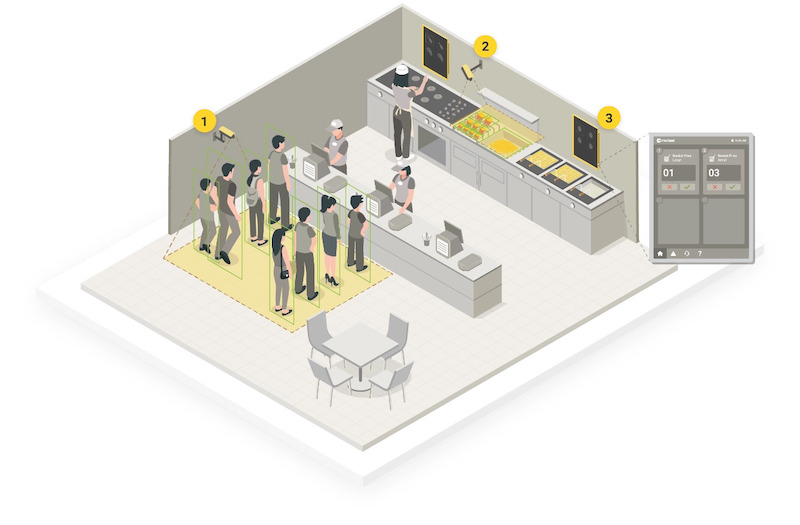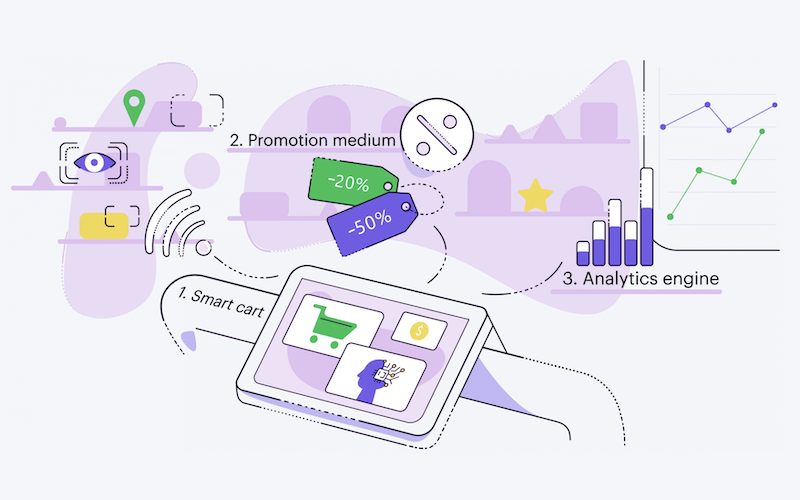PreciTaste’s artificial intelligence-based platform and Shopic’s clip-on smart cart device provide consumers with an enhanced shopping experience but also bring about concerns of shopper privacy and security.
AI and machine vision technology are finding increasing use in not only industrial automation, but commercial applications as well. Whether it is speeding up the food-to-table process in restaurants or making it so shoppers can bypass check-out and learn about their products as they put them in their cart, new technologies claim to enhance customer experience. Despite a smoother consumer process, concerns of how personal data is being used remains.

PreciTaste’s AI technology, the “QSR Brain,” forecasts demand for anywhere between fifteen minutes to two weeks. Image used courtesy of PreciTaste
Quick Service Restaurant (QSR) Brain
The technology being developed and marketed at the international corporation PreciTaste is one such example of how AI and machine vision technology are tracking personal data to enhance customer experience. Specializing in integrating process automation in the retail, manufacturing, hospitality, and restaurant industries via AI and machine learning, PreciTaste provides managers and store owners with tools to more efficiently run their operations, increase sales, and reduce food waste.
PreciTaste’s platform provides foodservice operators with the tools to optimize “demand-based cooking.” The company’s software solution, the QSR Brain, uses AI vision sensors to observe food packages as they are assembled. The extra pair of eyes ensures that the right order is assembled and packed for each customer. If an item is misplaced or missing, the system alerts QSR employees so that the order can be corrected. Customers can get the meal they want, while the food providers can provide a more efficient and less wasteful service.
The QSR Brain also allows users to monitor stock inventories for delivery-only teams, keep track of point-of-sale streams and food items, as well as help prioritize kitchen activities to make sure food is prepped and sorted for delivery. According to PreciTaste, the AI-based solution helps to reduce labor, simplify inventory checks, and improve productivity. The solution is also equipped to predict the supply and demand of resources needed to accommodate customer orders.https://www.youtube.com/embed/tnEQm00uwfI

Shopic’s Shop-E for smart shopping is shown to increase consumers’ monthly spending by up to 8%. Video used courtesy of Shopic
From Shopping Cart to Smart Cart
Another commercial application of AI and machine vision technology can be found being used by the start-up, Shopic. Their “frictionless” solution, Shop-E, helps consumers shop smarter and brings in greater revenue for store owners. The Shop-E clip-on device uses computer vision algorithms to identify store items that customers place into their shopping carts in real-time. The device can also display store promotions and available discounts for related items.
Shop-E can be fitted to any standard shopping cart and is designed for removal after a shopping session so that goods can be transported from store to vehicle. Customers can use the device for self-service check-out and grocers can use the analytics dashboard to manage store inventories and retrieve customer behavioral insights.
Despite greater efficiency and experience for consumers, the use of AI and machine vision in commercial applications raises concerns of consumer privacy and security. Image used courtesy of Shopic
Consumer Privacy and Security
In a case study involving the use of Shop-E in stores, Shopic states that its solution increased shoppers’ monthly spending by 8% and that it achieved a shopper satisfaction rate of 89%. This suggests that the public is in favor of smart shopping tech. But with increased shopper spending and the tracking of shopper behavior, what does this say about data security and privacy?
In 2018, Walmart submitted a patent detailing the design of a smart cart that would have the ability to measure a customer’s temperature, heart rate, and speed as they walk around the store. This was described as terrifying by one publication, and rightly so. Such personal biometric data could be used to influence shoppers’ behavior, potentially impeding on individuals’ freedom of choice.
While PreciTaste says that the protection of customer personal data is its top priority, their privacy policy also mentions that “although we take reasonable steps to protect your information, no website, Internet transmission, computer system, or wireless connection is completely secure.”

Food for Thought
Ultimately, shopper data is still vulnerable to security threats from unethical hackers. Hackers can use one of several methods of cyber attack, known as e-skimming, to steal consumer personal data and credit card information on the payment pages of eCommerce sites. Perhaps attacks like this might also be possible across both Shopic and PreciTaste’s devices and platforms.
In the likely situation where smart shopping and QSR technologies continue to grow in popularity and use, transparency concerning how personal data is used, and the potential risks of using such technology, might be considered more greatly to instill trust between producers and consumers.

